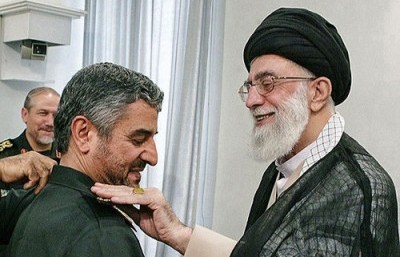PHOTO: Head of Iran’s Revolutionary Guards, General Mohammad Ali Jafari, with the Supreme Leader
LATEST
In an escalating domestic battle — which may involve the Supreme Leader— Iran’s Revolutionary Guards have criticized the Rouhani Government’s “engagement” approach to foreign policy and the Middle East.
The rhetorical attack came in a statement by the head of the Guards, General Mohammad Ali Jafari, on Thursday. He challenged unnamed Iranian officials for “blindly supporting” the July 14 nuclear deal and restoring relations with Western couontries.
Jafari used a speech earlier this week by the Supreme Leader, warning that the US would use the nuclear deal to encourage “sedition” inside Iran and to pursue its ambitions in the Middle East, for his assault:
The IRGC [Islamic Revolutionary Guards Corps] is strongly standing beside the brave and faithful people of Islamic Iran and thanks to this resistance, sympathy and unity…and with God’s help we will not allow the hegemonic powers to exercise influence on our country in any area.
See Iran Daily, August 18: Concerned About Region, Supreme Leader Is Cautious on Nuclear Deal
Jafari continued with the allegation that some Government officials were compromising the “regime’s dignity, passion, and revolutionary consciousness:
[They] believe that our behavior must be set within the framework of the enemy’s will….
Those who want to contradict the principles of the [Islamic] Revolution and [undermine] the orders of the Supreme Leader—to open new holes for foreign influence in the country—should know that we will never allow the growth and implementation of such thinking.
The internal conflict has been spurred by Iran’s involvement in Middle Eastern crises, notably in Iraq, Syria, and Yemen. The Islamic Republic’s investment of military commanders and weapons into Baghdad’s defense against the Islamic State has been hindered recently by protests against the al-Abadi Government, as well as the continuing hold of the militants on parts of the country.
The situation in Syria may be even worse, with Iran’s ally President Assad in political and military trouble amid rebel advances. Last week, a Russian-Iranian initiative seeking a way out through high-level political talks was blocked in a high-profile rejection by Saudi Arabia.
See Iran Daily, August 15: Tehran Tries To Rebuild Syria “Peace Initiative”
The Rouhani Government has tried to rebuild the initiative, including an appeal to Turkey through former President Hashemi Rafsanjani on Wednesday.
However, the Supreme Leader’s speech and Jafari’s statement indicate that Iran will also expand its military and financial involvement — despite the economic problems at home — in the 4 1/2-year Syrian conflict.
Jafari’s challenge to the Government may also have been prompted by fighting over political and economic issues. President Rouhani hit back at hardline critics on Wednesday with his declaration that the Government — rather than the Guardian Council — should oversee elections to ensure that candidates were not disqualified for political reasons.
See Iran Daily, August 20: Rouhani Challenges Guardian Council Over Next Elections
The nuclear deal is also stirring concerns within the Revolutionary Guards that its extensive holdings in the Iranian economy, including many of the contracts for engineering, logistics, and infrastructure, will be eroded. With the suspension or removal of US-led sanctions, foreign investment is likely in many of Iran’s sectors, including development of oil and gas fields.
Rouhani implicitly countered Jafari’s criticism yesterday:
The resolution of the nuclear issue is a topic which…can rectify economic issues and problems, produce prosperity, create employment for young people, and can event create conditions in which we aid and assist neighboring countries who are suffering.
Deputy Foreign Minister Hossein Amir Abdollahian backed up Rouhani’s “engagement” over the Syrian and Yemeni crises, seeking a renewal of discussions with Saudi Arabia:
We have always stressed that we welcome a dialogue with Riyadh.
We welcome cooperation in fighting terrorism and extremism, but what is important is that our Saudi friends have to distance themselves from pursuing a policy based on resorting to force and military actions in the crisis hotspots of the region.
But the President could be facing an increasingly tough challenge, given the hard line set by the Supreme Leader.
Yesterday Ayatollah Khamenei’s military advisor, General Yahya Rahim Safavi repeated the claim that the US “created” the Islamic State. In an interview with a Lebanese outlet, he said Iran has “credible and compelling security reports that show Abu Bakr al-Baghdadi, the leader of ISIS, goes to American camps and receives training there”.
(Hat tip to Iran Tracker for translations)
Backing for Nuclear Deal from Speaker of Parliament and National Security Council Head
The Government was bolstered on Thursday by support from key officials for approval of the July 14 nuclear deal with the 5+1 Powers.
Speaker of Parliament Ali Larijani responded to criticism, including from MPs:
There are several opinions on the nuclear deal itself; one is that we will find a weak spot in the very foundation of the text…and this will cause people to worry; some media outlets have this very same behavior, but in my opinion this behavior of ours is not productive for the country.”
Larijani assured, “We can see how we can utilize the nuclear issue and the JCPOA [Joint Comprehensive Plan of Action] document to achieve our goals.”
Ali Shamkhani, the head of the Supreme National Security Council, told an audience at Tabriz University that the SNSC’s review of the agreement “is in its final stages and the people should not have any concerns on this matter….The text of the JCPOA is such that it serves the interests of the Islamic Republic.”
The Government is arguing that the SNSC and not Parliament should be responsible for approval of the deal.

